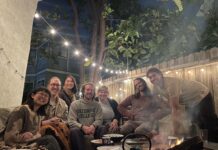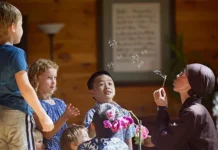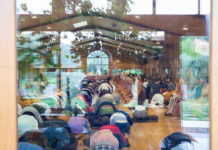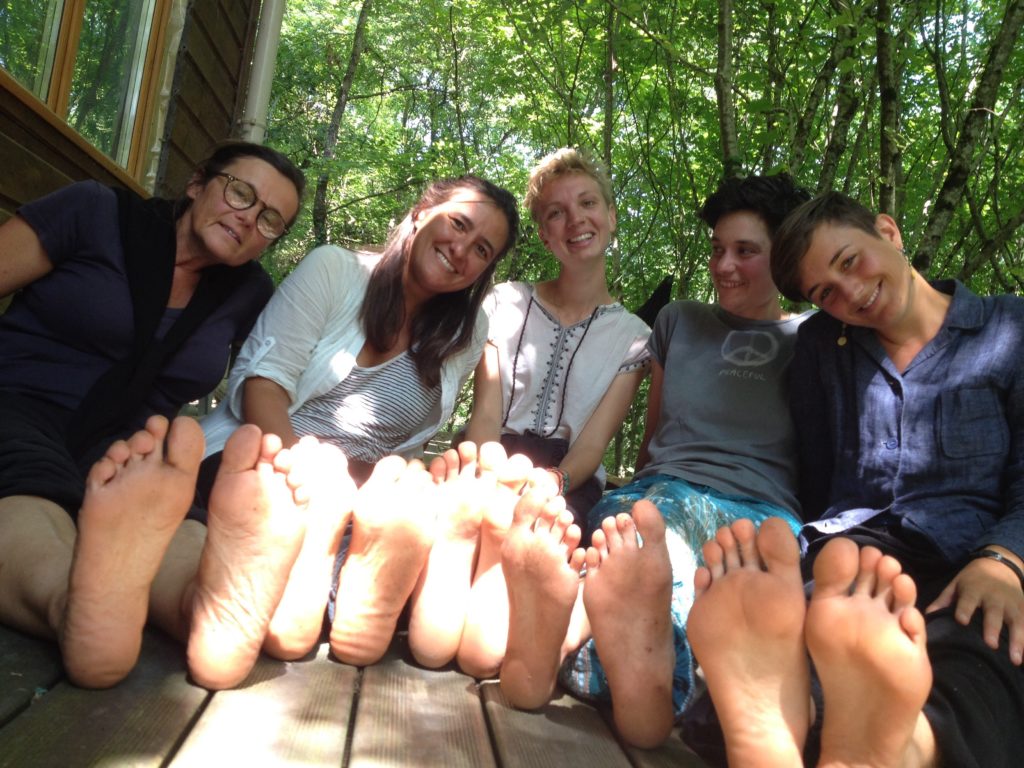
The Lower Hamlet Happy Farm brings ecological farming and the Plum Village mindfulness practice together. A team of five long-term friends works on this small organic vegetable farm on the monastic sisters’ ground with the occasional help of short-term volunteers. We asked the team who worked on the farm from November 2017 to August 2018 about their experiences.
August 1, 2018
Q: Please introduce yourself, what you did before you came to Plum Village and what is your task on the Happy Farm team.
Heidi: I come from Flanders, the northern part of Belgium. I am a mother and a grandmother, and I am a teacher. At the Happy Farm, I have crop responsibility for the leaves—lettuce, chard, spinach, etc.
(Note: Crop responsibility is related to our agro-ecological practice of crop rotation, an approach to decide which crop to plant in the vegetable garden from one year to the next. We do this to help manage organic soil fertility and to avoid or reduce problems with soil-borne diseases or pests. Every team member takes care of a group or “family” of vegetables, which means studying their life cycles and deciding when we can sow, weed or harvest. We all had a chance to learn deeply about some vegetable crops and carry the responsibilities together.)
Dorothée: I’m from France. I was a cartographer in Paris after studying geography and ecology. At the Happy Farm, I’m one of the two work coordinators, and I am responsible for the fruit family, which includes tomatoes, zucchini, pumpkins and cucumbers.
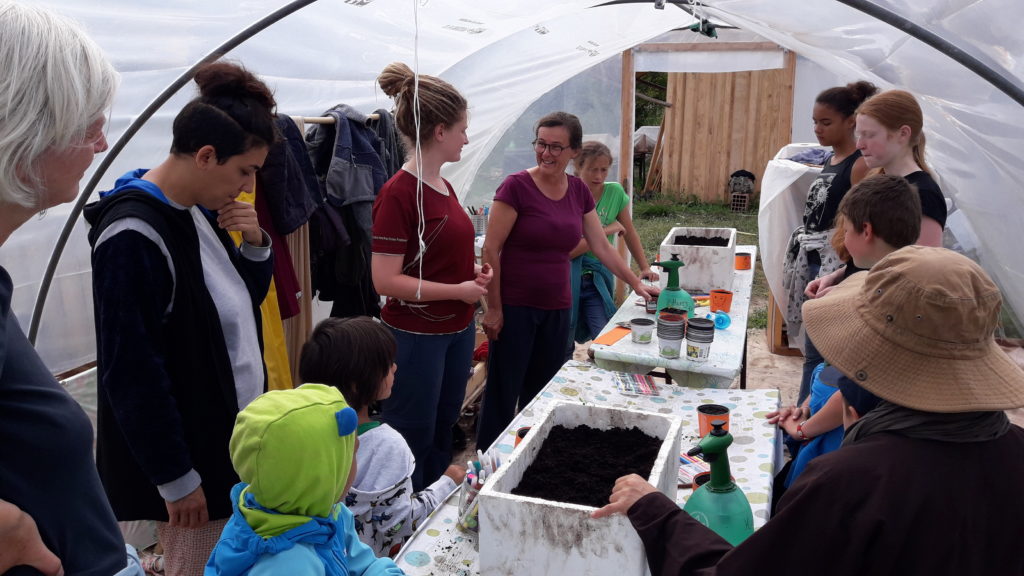
Judith: I come from Munich, from the south of Germany. I worked as a nurse in palliative care. My responsibility on the farm is maintenance, which means repairing and building things. I am also responsible for the roots family (e.g., carrots, radishes, beetroots), potatoes and strawberries.
Simone: I’m from the Netherlands. I lived in Freiburg in the south of Germany, where I studied environmental sciences and worked for NGOs in the field of food systems and sustainability. Currently, I share the work coordination and planning of the Happy Farm together with Dorothée. My crop responsibility is the brassica family, meaning cabbages, kale, Brussels sprouts, turnip, etc.
Katrien: I come from Flanders in Belgium, like Heidi. I lived and worked at a permaculture educational garden as a volunteer for ten months. I take care of the farm finances, and my crop responsibility is green manures and the vegetable family, which includes beans and peas.
Q: What is your approach for bringing mindfulness and organic farming together?
Heidi: At the beginning of the working meditation, we come together and take time to arrive at the farm. We sit in a circle and start with a five-minute sitting meditation to go back to the body and breath. After that, we do an inner weather check to share briefly with each other about how we are doing. While working, each one of us aspires to work mindfully with our bodies, the tools, the earth and the plants. We invite the bell during the session every now and then, so we can stop come back to our body and our breath. We become aware of the mind distracted by thoughts. Being truly present with ourselves, the plants, the earth and the farmers make us feel very connected, and that is nourishing.
Being truly present with ourselves, the plants, the earth and the farmers make us feel very connected.
Dorothée: What helps to bring mindfulness into the work is the silence, and the aspiration to keep moments of silence during working meditation and to be with the plants and the nature elements around us.
Judith: How I see the mindfulness practice on the Happy Farm is that the farm itself is a good Dharma teacher. I can see interbeing in its pure nature. It’s beautiful to discover that we are—together with the earth, the soil, and the little animals and insects—generating this farm. If one part were missing, it wouldn’t be the healthy ecosystem that it is now. It is interesting for me to see that we are only a little part of the farm’s interbeing nature to grow vegetables to support the Sangha.
Simone: I would like to add that we work on the farm as a Sangha. The Happy Farm is embedded within the manyfold Sangha of Lower Hamlet; our team and the volunteers who join us are a small Sangha. We aspire to take care of ourselves and one another when we have difficulties. We regularly practice Dharma sharing, specifically on how we are doing on the farm and with our work habits. We learn about listening to each other and speak up when something is important to us. The practice of deep listening and loving speech is part of our everyday farm life.
Q: What were some of the most beautiful experiences you had as a volunteer on the farm?
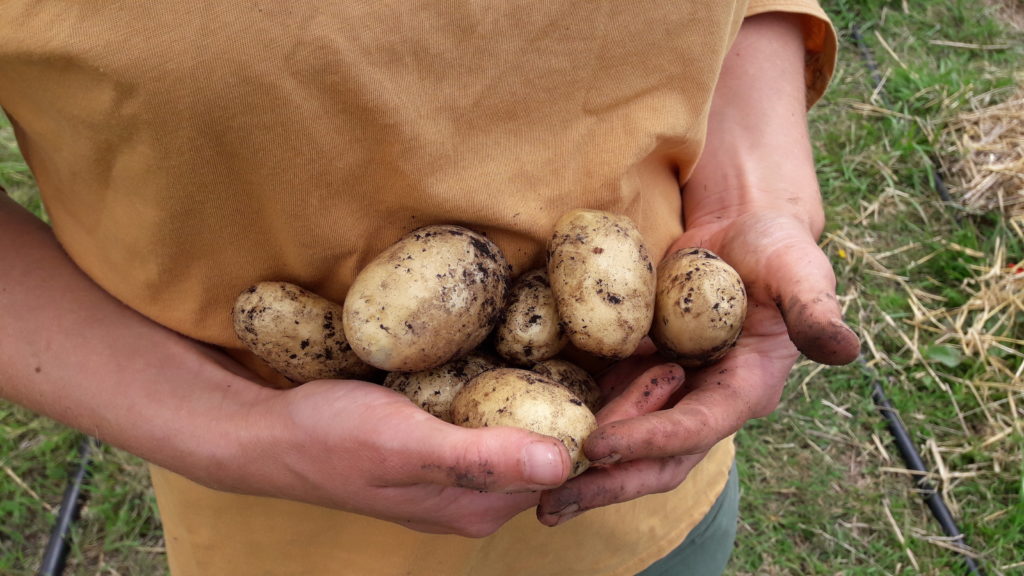
Katrien: What comes up now for me is that when we invite short-term retreatants to work with us, we do a check-out with them afterwards, so they can share about their feelings during the working meditation. It’s beautiful to listen to their experiences while we work mindfully on the farm.
Offering the space of the farm to everyone (including children during the summer retreat), giving them the experience of being in nature and learning about organic farming is a big joy for me. It is such a beautiful experience to share my joy of harvesting, discovering the compost, planting and putting a seed in the earth with other people.
Q: What were some challenges you encountered on the Happy Farm?
Dorothée: A big challenge was that we were a brand new team at the beginning of this year. We had a lot to learn about the farm’s organisation, and we had to get to know each other. I have learned about farming, as well as about myself and my relationship with others; that’s a joy. It was sometimes painful because we had so much to learn at the beginning and adapt with everyone’s personalities. But yeah, we did a great job!
Judith: A challenge I was not aware of when I applied to work on the Happy Farm was that you are separate from the main Sangha in many of its activities. You’re taking care of the living being, which means you need to be aware of what you’re doing, so you have a big responsibility towards it. Working on the farm means you cannot attend every Dharma talk or sharing.
You cannot be present for the Sangha because you could be volunteering another task. That was the main challenge for me, especially during the 21-Day Retreat, because all of us wanted to participate in the retreat, but we needed to work on the farm. This often led to the question: Who goes when and to what activity? Since it was intense, I needed to find ways to save energy and time for myself. I wasn’t aware of this challenge when I applied.
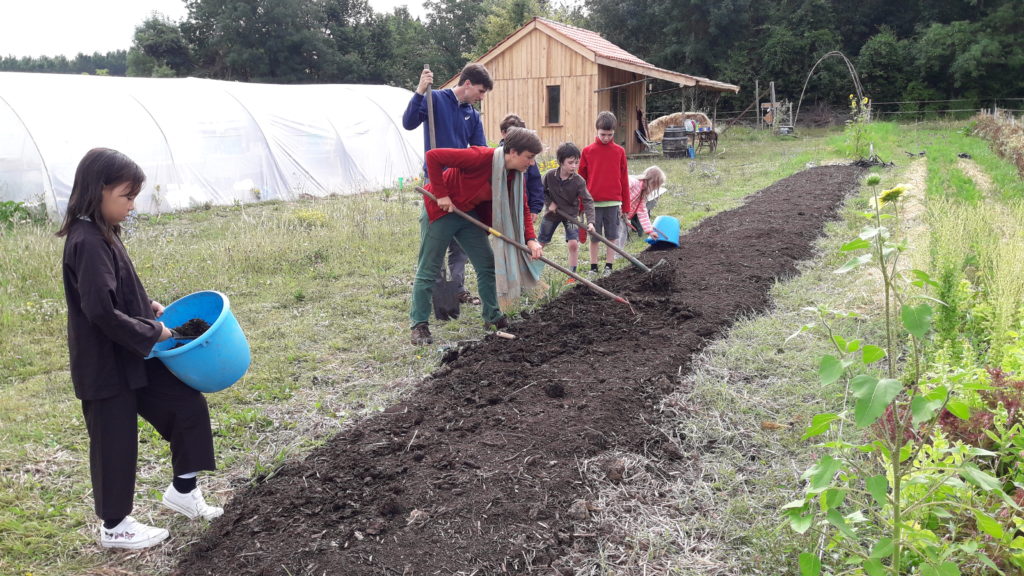
Simone: One of the biggest challenges I saw during the last few months was encountering different opinions in almost any situation. On a farm, you can do things in many ways; we all have previous experiences and ideas about how things could, should or are supposed to happen. It was a challenge for us to deal with these different opinions and listen to each other, and not always press for our own opinions. Sometimes we just stopped, listened and let go of our view of how things should go.
This has been a practice of tolerating and accepting everyone’s different viewpoints and perspectives. I practiced seeing their viewpoints that are as valuable as mine. Sometimes I held back my opinion and waited a second before giving my answer on how things should go or how I think it should go. It was a practice of finding happiness in trusting the team and our shared wisdom. It reminds me of something Brother Phap Dung shared in a Dharma Talk this past summer: “Do you want to be right, or do you want to be happy?”
Q: What did you learn about yourself and/or about the reality of farming over the last few months?
Katrien: My experience is very positive. One thing I learned working on the Happy Farm is the impermanent nature of life. In the beginning, I was often worried about the garden, if our plants will survive the cold, or if the slugs will eat the lettuce. Seeing that conditions are changing and that I don’t have much control, I had to practice letting go and just accept the reality. It became clearer to me that the garden is a living being. It’s not me taking care of the earth; it’s the earth taking care of itself. We are just there, one of the conditions helping to grow vegetables. It has been a big practice for me to let go of the idea of control and of the worries connected to that.
Q: Thank you. Where are you going next, and what is going to happen with the farm?
One thing I learned working on the Happy Farm is the impermanent nature of life.
Heidi: I will leave soon. Next year I will be in Belgium again to be closer to my children and my grandchild. Probably I will work again as a teacher, and I hope to include some of the practices. My dream is that when I am working in a school, I can invite my colleagues to be together and make a little Sangha of teachers. We can practice sitting meditation and have Dharma sharing.
Judith: I’m also leaving the Happy Farm next season. I will study medicine in April 2019. Depending on the answer I get from the university, I might stay in Plum Village to take on another volunteering task to deepen my practice or to study. I have a deep aspiration to bring more mindfulness into medicine.
Simone: Dorothée, Katrien, and I will continue for another season on the farm in 2019, together with two new interns. In the beginning of this season, we had many ambitions for the farm. We have manifested some of them, like building a toolshed, building a beautiful office and gathering space, planting more perennials like berries and trees and including the Sangha more into the farm. Next year, we’ll continue inviting the Sangha — both retreatants and monastics — further into the farm work and life; for instance, we plan to host two Happy Farm Experience Weeks in May and September 2019.
Other aspirations we have for the next year include making our water source more sustainable, saving seeds, building a nursery where we can raise our seedlings, designing and starting to plant a forest (edge) garden and building a winter greenhouse so we can provide fresh greens to the Sangha in winter. Our wish list is big!
However, for the purpose of all the things I’ve just mentioned, we will also need to put some effort into fundraising because the farm runs completely on donations. We happily donate our time and energy, and we rely on monetary donations from the worldwide Sangha to manifest our dreams. At times, it can be a challenge to not get carried away by our dreams and get caught in busyness… but if we do, some sisters are there to remind us of what Thay has taught us all: “The best way to take care of the future is to take care of the present moment.” J
Interview conducted by Annica and transcribed by Greg Sever
To watch a fun and informative documentary on the Happy Farm, visit https://dafilms.com/film/10468-happy-farmers-en-version. A reflection from the filmmaker of the documentary can be read here.

